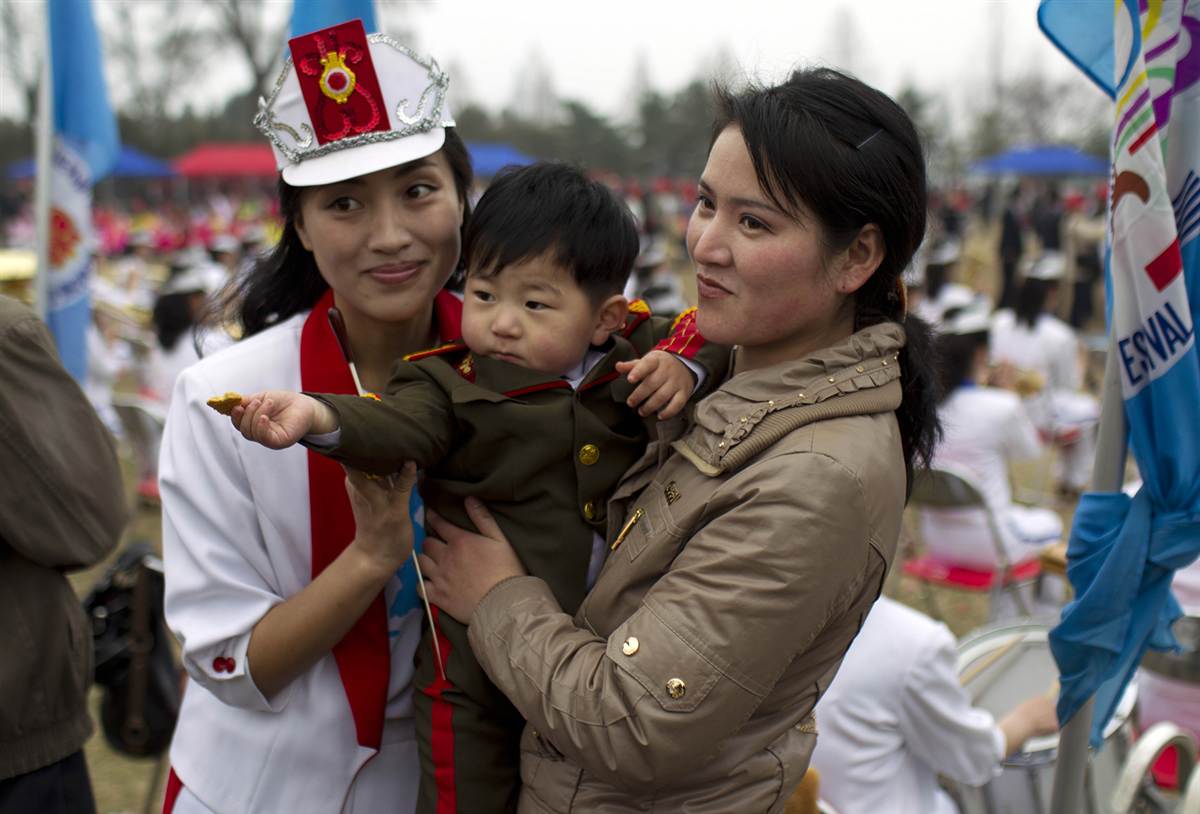(单词翻译:单击)
One of the best books written about North Korea is Nothing to Envy by Barbara Demick. In it, she brilliantly reconstructs the lives of ordinary people living in Chongjin in the remote northeast of the country. I say “reconstruct” because her narrative is pieced together almost entirely from talking to exiles who managed to flee the country. Demick visited North Korea several times, but learnt little of value. “Visitors hewed to a carefully selected itinerary of monuments,” she wrote. They were assigned “minders” who ensured “there was no contact permitted with ordinary citizens”.
关于朝鲜最好的著作是芭芭拉•戴米克(Barbara Demick)的《没什么可嫉妒的》(Nothing to Envy)。书中,她精彩地重构了朝鲜偏远的东北城市清津(Chongjin)普通人的生活。我用“重构”这个词,因为她的叙述几乎完全由成功逃出朝鲜的流亡者的访谈拼接而成。戴米克去过朝鲜几次,但没有看到多少有价值的事情。“来访者被圈在精心挑选的纪念碑行程上,”她在书中写道。当局给他们安排了“看守”,保证他们遵守“不允许与普通市民接触”的规则。

Until last week, I had never been to North Korea. I always felt faintly queasy opining about a country I had never set foot in. This month, finally, I managed to get there as part of a small delegation with the EU-Asia Centre, a think-tank dedicated to promoting better ties between Europe and Asia. Our five-day trip took us to Pyongyang, to the demilitarised zone on the tense border with South Korea and to Mangyongdae, a mountainous region that is the birthplace of Kim Il Sung, the nation’s founder. So what, if anything, did I learn?
我过去从未去过朝鲜。要就一个我从未踏足过的国家发表看法,我总感觉有一丝不安。本月,作为致力于促进欧亚关系的智库“欧盟-亚洲中心”(EU-Asia Centre)的小型代表团的一员,我终于设法来到了朝鲜。我们5天的行程包括平壤、朝韩紧张的边境上的非军事区(DMZ)以及位于山区的朝鲜开国领导人金日成(Kim Il-sung)的出生地万景台(Mangyongdae)。那么,我看到了什么呢?
The first is that Pyongyang – or at least what I was able to see of it – looks slightly less grim than I had imagined. True, many of the austere buildings have all the charm of a Soviet housing estate. True, too, there are few shops to be seen. The city, designed to project power and prestige, is built on a decidedly inhuman scale. Yet there is more bustle than you might expect. There are more cars than just a few years ago, many of them new. It is a development that has necessitated the installation of traffic lights. Many women wear high heels in a variety of fashions, imported from China and evidently not manufactured in Pyongyang Shoe Factory Number 1. There’s an ice rink and a bowling alley and some pleasantly manicured parks.
首先,平壤,或者至少我看到的那部分平壤,看起来比我此前想象的可怕景象稍好一些。没错,许多朴素的建筑带有苏联式工人新村的全部“魅力”。同样没错的是,很少看到商店。这个城市的设计宗旨是展示权力和威望,规模大得不那么“宜居”。但这个城市也许比你想象的更繁忙。比起几年前,路上的汽车更多,很多还是新的。这种发展使安装交通灯变得必要。许多女人穿着各式各样的高跟鞋,这些鞋子从中国进口,明显不是由平壤第一制鞋厂生产的。有一个溜冰场、一个保龄球场和一些精心养护的公园。
Our group was barred, or otherwise dissuaded, from entering ordinary supermarkets. The few shops we did glimpse stocked a reasonable range of goods, including Japanese snacks, Dutch beer (Heineken) and Chinese instant noodles. Foreign currency is accepted. Shop assistants are able to rattle off prices in euros, renminbi and dollars – just for starters. (No mention yet of the Scottish pound.) No one hides the fact they have foreign currency, even though this can only have been obtained outside the state system. Much, apparently, makes its way down what is known as “the road of life” from Dandong on the other side of the Chinese border.
我们一行被禁止(或者被劝阻)进入普通的超市。我们有幸光顾的几家商店里摆放的商品种类还比较多,包括日本小吃、荷兰啤酒(喜力)和中国方便面。店里接受外汇。售货员能够快速报出用欧元、人民币和美元等货币计算的价格(未提到苏格兰磅)(编者注:此文写于苏格兰独立公投之前)。没人隐瞒他们拥有外汇的事实,尽管这些外汇只能从国家体系之外获得。很明显,其中很多是从朝中边境对面的丹东流入朝鲜的,这条途径被称为“生命线”。
One needs to be wary of impressions gleaned from Pyongyang. This is a showcase city, the home of the connected and presumably loyal elite. You have to remind yourself constantly that you are being shown the “good parts”. The rest of North Korea is, to quote resident diplomats, “another country”.
人们需要警惕平壤给人的印象。这是一个橱窗城市,是有关系的、想必忠诚的精英阶层的家园。你必须不断提醒自己,你被带去参观的地方只是“好的部分”。用一位驻朝外交官的话来说,朝鲜的其他地方是“另一个国家”。
The second thing to note is the pervasive sense of victimhood. Paul French’s book, North Korea: State of Paranoiais aptly named. Any conversation on a serious topic starts and ends with Pyongyang’s struggle for survival in the face of unrelenting pressure from “the imperialist US” and its “puppet” South Korean servant. The US wants to control all of northeast Asia. China wants to use North Korea as a buffer. Everyone wants to topple the Kim regime. (Just because you’re paranoid, doesn’t mean they’re not out to get you.) Singled out for opprobrium are the regular US-South Korean military manoeuvres, which are deemed ample justification for Pyongyang’s nuclear weapons programme. Even economic policy is framed in terms of external threat. That is why North Korea must be self-reliant – something it has patently failed to achieve given its dependence on outside aid. Paranoia assumes an almost surreal quality. Asked about the rate of economic growth, the head of one institute replies: “It is the policy of our party not to reveal statistics about our economy.”
第二件值得一提的事情是受害者心态的弥漫。保罗•弗伦奇(Paul French)所著的《朝鲜:偏执之国》(North Korea:State of Paranoia)书名颇为贴切。任何涉及严肃话题的交谈的开头和结尾,都是平壤如何在“美帝”和“南朝鲜傀儡政权”持续不断的压力下挣扎求生。美国想控制整个东北亚。中国想把朝鲜当成缓冲区。每个人都想颠覆金氏政权(仅仅因为你有偏执症,并不意味着人家会放过你)。美韩经常举行的军事演练尤其是厉声谴责的对象,被视为足以证明朝鲜应当推进核武计划。就连经济政策也被置于外部威胁的框架内。这正是朝鲜必须自给自足的原因——而依靠外部援助的朝鲜显然未能做到自给自足。这种偏执还带上了一种几乎称得上荒诞的性质。在被问及经济增长率时,一个机构的负责人回答:“我党的政策是不披露我国经济统计数据。”
A third observation, hardly surprising, is the sheer intensity of the cult of Kim. The interests of state and dynasty have merged. One senior researcher quoted a poem suggesting the Kims would rule forever. No mention of the nation’s founder is complete without the epithet “Great Leader” and no reference to his 31-year-old grandson and current ruler without a nod to “the wise leadership of the Great Marshall Kim Jong Un”. Kim badges, worn over the heart, are obligatory. So is bowing at the foot of the dynasty’s ubiquitous monuments.
我观察到的第三个现象是对金氏统治者的极度膜拜,这一点不会让人意外。国家利益和金氏王朝的利益融为一体。一位高级研究人员引用了一首表达金氏家族王朝永固的诗。但凡提到国家的开国者,就必须加上“伟大领导人”的称号,但凡说到现在的统治者、开国者现年31岁的孙子,就必须称赞“伟大元帅金正恩(Kim Jong-un)的英明领导”。将金氏统治者的像章佩戴在心口,是强制性的。人们也必须在金氏王朝随处可见的纪念碑脚下鞠躬。
Yet in the end, Demick is right. A visit to North Korea reveals little. Our trip resembled The Truman Show, in which the protagonist is trapped in a televised soap opera. In the North Korea I visited, the food was ample, the waitresses were pretty and the soldiers at the DMZ taller than average. It was like some warped version of Garrison Keillor’s Lake Wobegon, “where all the women are strong, all the men are good looking and all the children are above average”. Except that, thanks to food shortages and a broken economic system, that is almost exactly the opposite of the truth.
然而最终而言,《没什么可嫉妒的》作者戴米克是对的,朝鲜之旅没什么收获。我们的行程就像《楚门的世界》(The Truman Show),电影的主人公被困入了在电视上播放的肥皂剧。在我访问朝鲜期间的所到之处,食品是充足的、女侍者是漂亮的、非军事区士兵的身高高于平均水平。这就像是扭曲了的盖瑞森•凯勒(Garrison Keillor)的沃比根湖(Lake Wobegon),“那里所有的女人都很强壮,所有的男人都很英俊,所有的孩子都优于平均水平”。只是,由于食物短缺和经济体制失灵,这一切表象几乎正是真相的反面。


